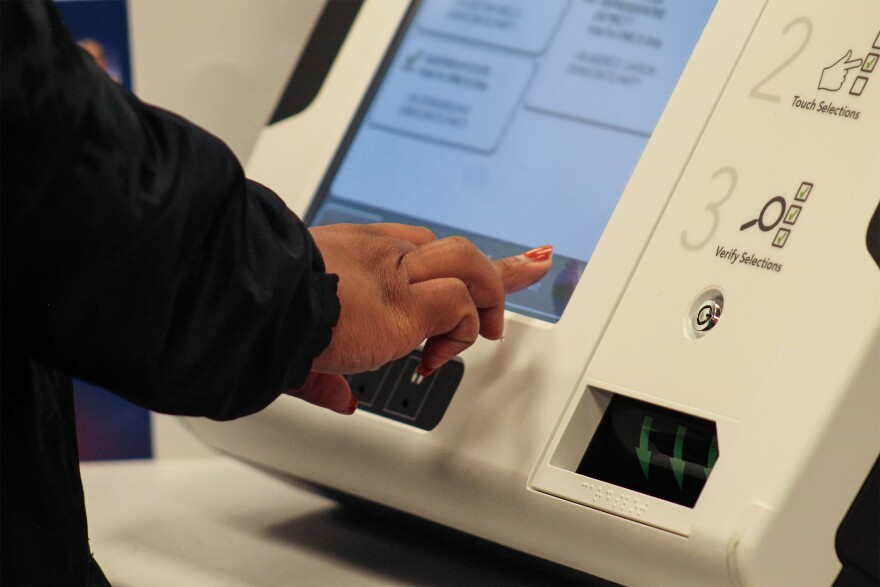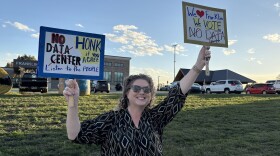Indiana’s primary election is on May 7, 2024. What do you need on Election Day? Where can you find your ballot to research candidates ahead of time? Does your vote really matter?
We received questions through the Indiana Two-Way, a weekly text group that provides news updates and asks questions to inform our reporting. To join, text the word “Indiana” to 765-275-1120. We’ll continue answering election questions through the general election in November.
Does my vote really matter?
Indiana, like most states, has had several elections where a small number of voters decided the winner.
Especially in midterm and primary elections – when fewer voters cast ballots – showing up can make a bigger difference.
Only 14% of Hoosiers voted in the 2022 May primary.
What do I need on Election Day?
You need a photo ID.
Under Indiana’s 2005 voter ID law, your photo identification must meet five criteria: it must display your photo, your name (though, it doesn’t have to be a perfect match), an expiration date and either be current or have expired sometime after the date of the last general election, and issued by the state of Indiana or the U.S. government.
There are a handful of photo IDs that fall into those categories. An Indiana driver’s license, a U.S. passport, Indiana State Identification Card, or military ID card all work. And student IDs at Indiana state colleges and universities may also work – as long as they follow the rest of the criteria. However, students at private institutions may not use student IDs for voting.
Who is eligible to vote in Indiana?
There are a few qualifications to vote in Indiana. First and foremost, you must be both a U.S. citizen and a resident of Indiana. Additionally, you must be 18 years old on or before Election Day, Nov. 5, 2024. That means 17-year-olds who turn 18 on or before Nov. 5 are eligible to vote in Indiana’s primary election.
People who are currently in prison after being convicted of a crime cannot vote in Indiana. But their voting rights are restored upon release. And you have to have lived in the precinct you’re voting in for at least 30 days before the election. Otherwise, if you moved within the state of Indiana, you will vote in the precinct you moved from.
Finally, you have to be registered to vote.
How do you register to vote?
The easiest way: go to IndianaVoters.com. The Indiana secretary of state runs the site, and allows you to register to vote, update address information, check your registration and find your polling place on this website.
But you also must have a valid Indiana driver’s license or other ID issued by the state of Indiana or the U.S. government.
You can register to vote in-person or by mail by filling out a voter registration form. Indiana residents can register to vote without a driver’s license or Indiana State Identification Card – but, because of Indiana’s voter ID laws, you’ll have to have a legal identification card issued by the U.S. government or the state of Indiana on Election Day.
Certain military and overseas voters have extended registration deadlines. All that information is available on the Indiana secretary of state’s website.
How can I find when and where to vote?
On Election Day, polls are open from 6 a.m. to 6 p.m. local time. To find your polling place, go to IndianaVoters.com and search under your Voter Portal. At the very top of the page, it lists the locations you’re able to vote on Election Day.
There are 63 Indiana counties that have vote centers, where any county resident is able to vote at any polling place, no matter their address. The General Assembly passed legislation in 2011 that opened vote centers as an option for all counties – pending local government approval.
Indiana in-person early voting is available to all Hoosier voters for the four weeks leading up to Election Day. Times and locations are more limited than day-of voting, but they are available at IndianaVoters.com.
Can I vote by mail?
In Indiana, not everyone is eligible for vote-by-mail. They must fall under one of 12 acceptable categories:
- I have a specific, reasonable expectation of being absent from the county on election day during the entire 12 hours that the polls are open.
- I will be confined to my residence, a health care facility, or a hospital due to illness or injury during the entire 12 hours that the polls are open.
- I will be caring for an individual confined to a private residence due to illness or injury during the entire 12 hours that the polls are open.
- I am a voter with disabilities. NOTE: if you are unable to mark the ballot or sign the ballot security envelope, you must contact the county election board to process your application.
- I am a voter at least 65 years of age.
- I will have official duties outside of my voting precinct.
- I am scheduled to work at my regular place of employment during the entire 12 hours that the polls are open.
- I am unable to vote at the polls in person due to observance of a religious discipline or religious holiday during the entire twelve (12) hours the polls are open.
- I am a voter eligible to vote under the “fail-safe” procedures in IC 3-10-11 or 3-10-12.
- I am a member of the Indiana National Guard deployed or on assignment in Indiana or as a public Safety Officer.
- I am a “serious sex offender” (as defined in IC 35-42-4-14(a)).
- I am prevented from voting due to unavailability of transportation to the polls.
If you fall into one of these categories, you may request an absentee-by-mail ballot from your county election board. The Indiana secretary of state’s office has an online portal to request a ballot. However, you must make that request no later than April 25 for the primary election.
Where can I find my ballot? And where can I find information on candidates?
There are lots of places you can go – including candidate websites, local media outlets and even specialty voting guides on issues important to you.
Go to IndianaVoters.com and select “Check my registration.” Once you log into your Voter Portal, scroll to “Who's on the Ballot.”
We’ve also compiled a tip sheet for finding more information about the candidates on your ballot to make informed decisions when voting.
Where can I find information on school referendums?
Only three school corporations in Indiana are seeking voter approval for referendum funding this May.
Here’s a calculator to see how these proposed referendums would affect your property taxes.
Lawmakers changed state law in 2021 to require new referendum language on ballots. They now include percentages about a school's average property tax revenue, among other things. That same year, lawmakers also created a requirement for schools to post revenue spending plans so the public can better understand how those dollars would be used.
But school leaders and experts have concerns about that lengthier language on voters' ballots.
What rights do I have as a voter?
Voting places must be accessible to Hoosiers with disabilities. For example, if you’re unable to stand for long periods of time, you can request a chair. Or if you’re visually impaired, you may request a magnifier.
Voters with disabilities may seek assistance from poll workers (one from each political party). You’re also able to designate a friend or relative to assist you during voting – but they must complete an Affidavit of Voter Assistance at the Polls. That’s available at the polling station, before entering the voting booth.
Hoosiers who cannot read and/or write in English can also request assistance at a polling place.
Indiana Secretary of State’s Office
(866)-IN-1-VOTE (866-461-8683)
They’ll have staff on hand for phone calls from 6 a.m. to 7 p.m. Eastern.
Indiana Disability Rights
Voice (317) 722-5555
Toll Free (800) 622-4845
Text Telephone (TTY) (800) 838-1131
Indiana Election Division
Direct (317) 232-3939
Toll Free (800) 622-4941
How do I make sure my voting place is accessible?
The Help America Vote Act of 2002 requires each polling place to have at least one accessible voting machine, in addition to making the facility accessible.
Voters with physical disabilities may seek assistance from poll workers (one from each political party). You’re also able to designate a friend or relative to assist you during voting – but they must complete an Affidavit of Voter Assistance at the Polls. That’s available at the polling station, before entering the voting booth.
If there is an issue with accessibility at your polling place, you can call the Indiana Secretary of State’s office and file an accessibility grievance form.
Join the conversation and sign up for the Indiana Two-Way. Text "Indiana" to 765-275-1120. Your comments and questions in response to our weekly text help us find the answers you need on statewide issues and the election, including our project Civically, Indiana.
Can someone vote if they are housing insecure?
Short answer: yes.
People who have a non-traditional residence, like those who are unhoused or those who live in a motor home, must still provide a location sufficient to allow local election officials to place the person in a precinct. If you stay in more than one place, voter registration officials should ask you to designate the location where you usually sleep in the county.
Your best chance of registering to vote will be working with your county election board. If the place has no street address, you’ll be asked to indicate the location by drawing a map or writing a description of the location on the state’s voter registration form or federal mail-in registration form in the appropriate box.
You’ll also be asked to provide a mailing address within the county where you reside – that being said, P.O. boxes cannot establish residency.
For online voter registration, you’ll be asked to provide an intersection for your address, which county officials will use to determine your precinct.
Does Indiana purge voter rolls?
Yes – but there are a few steps election officials are required to follow before someone should be removed.
It is a best practice to double check your voter registration before the deadline closes for every election you intend to vote in. For 2024, the deadline to register to vote in the primary is April 8 and the general election is Oct. 7. You have until midnight on the Indiana secretary of state’s website, IndianaVoters.com, or until end of business at your county clerk’s office.
Indiana registered voters will semi-regularly receive postcards from the Indiana Election Division as part of voter roll maintenance. Federal law governs how states clean their rolls. The postcard mailing is the most common. If you receive a postcard and it correctly lists your name and address, you don’t have to do anything.
However, if the postcard gets returned to the Election Division as undeliverable, a second mailing is sent out. That second postcard asks the voter to update or cancel their registration.
If that second mailing comes back as undeliverable and nothing else happens, a person’s registration can still only be canceled if they haven’t voted in two, consecutive federal elections.
Legislation passed in the 2024 legislative session to provide state and local election officials more ways to potentially remove people from the voter rolls.
The controversial measure requires the state to compare voter registration to Bureau of Motor Vehicles data on credentials given to noncitizens. People flagged by that comparison would have to show proof of citizenship to their county election officials within 30 days in order to be able to vote.
This portion of law doesn’t take effect until July 2025. Critics say the legislation violates federal law.
Lauren is our digital editor. Contact her at lchapman@wfyi.org or follow her on Twitter at @laurenechapman_.
Copyright 2024 IPB News.





